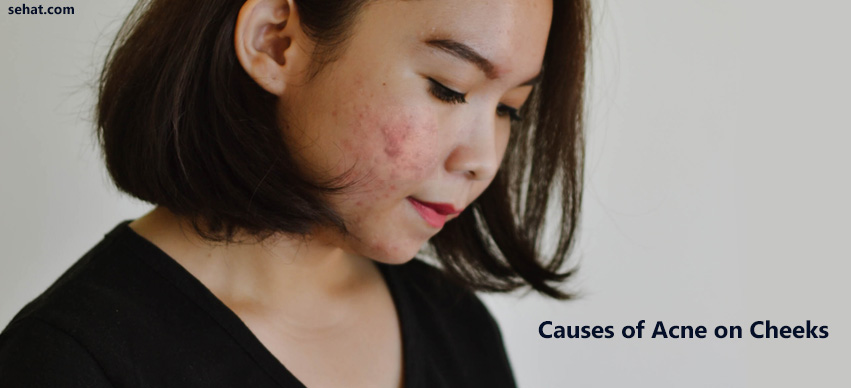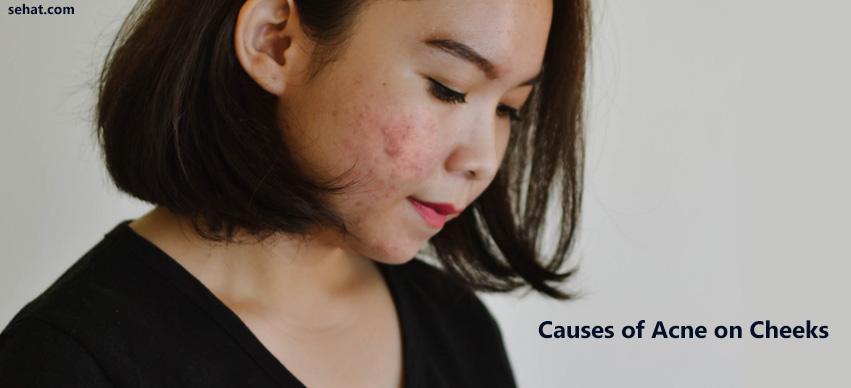Unveiling The Best Collagen Supplements For Women: Enhancing..
5 Min Read


Acne is the commonest chronic skin condition affecting millions of people worldwide. It is also the most commonly diagnosed dermatological disorder worldwide. Besides its effects upon the skin like scarring and hyper-pigmentation, acne also tends to impact the lives of people negatively on a mental level bringing on a feeling of inferiority or making them conscious about their looks. Before knowing what causes acne on cheeks, it is necessary to understand a little about the normal structure and layers of skin.
The normal skin has 3 layers;
Acne is also called as acne vulgaris in medical terms. It is a chronic inflammatory condition affecting the sebaceous glands, hair follicle or hair shaft present in the dermis of the skin.
According to statistics, about 2/3rd visits to a dermatologist for acne are made by women. The mean age of patients seeking treatment for acne is about 15 – 25 years, probably owing to the several hormonal changes that take place during this age group.
However, acne may continue to occur in persons even beyond the age of 25 years. Appropriate treatment is possible only when we know what causes pimples on the cheeks.
Acne can be of the following types;
It is a severe form of acne where multiple pores are infected resulting in the formation of the abscess filled with pus. This type of acne takes a lot of time to heal and may also leave behind scars or pigmentation on healing.
Seen commonly in women from the overuse of cosmetics. This type of acne is seen mostly on cheeks, chin, and forehead.
This type of acne occurs from the use of medications and can be seen commonly on the back or abdomen.
This form of acne is of a short duration wherein the lesions are crusted and ulcerated and is often associated with fever.
Acne can be graded as follows based on the type and severity
| Grade 1 | Comedones, occasional papules |
| Grade 2 | papules, comedones, few pustules |
| Grade 3 | predominant pustules, nodules, abscess |
| Grade 4 | cysts, abscess, scarring acne |
Acne presents typically like the following;
Acne develops when the hair follicle, hair shaft or the sebaceous glands present in the dermal layer of skin gets infected.
Some of the basic underlying cause for acne on cheeks, chin, and forehead is disturbed activity of the sebaceous glands due to causes like;
Genetics Have found to be associated with an increased risk of having acne. It can be a presenting feature of rare genetic diseases like Apert’s syndrome and also XXY syndrome.
It can trigger acne as is seen in women before or during menses, during pregnancy and during puberty in both boys and girls. The secretion of androgens causes the pores on the skin to enlarge. Due to this, the skin becomes oily due to excess sebum.
Some medical conditions associated with hormonal irregularity and acne are polycystic ovarian syndrome and androgen-secreting tumors.
Frequent acne is also associated with hormone replacement therapy or from the consumption of hormonal supplements.
Staphylococcus aureus, bacteria found on the skin is mostly responsible for infecting hair follicles or sebaceous glands. Bacteria Cutibacterium Acnes has also been found responsible for excess sebum production and inflammation.
This is a major contributing factor to most of the infectious and non-infectious medical conditions. Constant stress often results in inappropriate diet, lack of sleep and release of stress hormones which may worsen acne.
A strong relationship has been established between acne and what we eat. While the foods rich in vitamins, minerals, antioxidants, and omega-3 fatty acids improve skin texture and prevent acne breakouts, sugary foods like chocolates and candies, oily or greasy foods may aggravate acne.
some lifestyle factors which may worsen acne are;
Some prescription medicines like anti-epileptic drugs, antibiotics, anti-tubercular drugs, oral contraceptives, hormone replacement therapy, and chemotherapeutic drugs may aggravate or trigger acne.
You need to see a doctor for acne under the following conditions;
Acne specifically does not require any treatment unless it is of a severe form. What causes pimples on cheeks generally helps in guiding the line of treatment so that the root cause can be addressed.
Grade 1 and 2 acne can be treated by simply taking better care of the skin by regular cleansing, dietary and lifestyle modifications.
Grade 3 and 4 cystic acne requires dermatological assistance as these are severe forms of acne and can produce severe scarring if left untreated or if managed poorly.